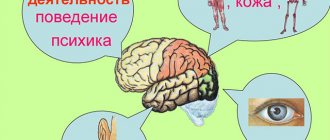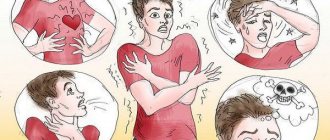The word “phobia” is translated from ancient Greek as “fear”. First of all, it should be said that this feeling is completely natural for any living creature. Fear of anything and fear for one’s life and health are directly related to the instinct of self-preservation, which is basic, ensuring the physical survival of both an individual and the entire species as a whole.
The feeling of fear forces us to take care of ourselves and avoid potentially dangerous situations. Primitive man was afraid of fire, thunder, darkness, and attacks by wild animals. In the process of evolution, our distant ancestors learned to cope with most of these dangers, and some of them even put them at the service of humanity, but many remained with us forever, transformed into feelings of anxiety and restlessness, which are sometimes difficult to explain.
Our fears can be either absolutely normal or irrational, arising in the face of an imaginary threat. An inadequate and illogical reaction to non-existent threats may indicate the emergence of one or another mental disorder that subjugates the individual’s consciousness and prevents him from living a normal life and enjoying simple things.
When the fear of an object or phenomenon becomes excessive and begins to cause psychological and physical discomfort, with a high degree of probability we are talking about a phobia, which is a deviation from the norm.
There are a great many different phobias. Just think: experts call the figure approaching 40 thousand! Among all this diversity, there are some very common ones that are heard by everyone: claustrophobia (fear of closed spaces), social phobia (fear of what can happen to a person in society), thanatophobia (fear of death), nyctophobia (fear of the dark), glossophobia ( fear of public speaking), autophobia (fear of loneliness), and quite specific ones. So, there are people who literally physically feel and are afraid of the passage of time (chronophobia), teenagers (ephebiphobia) and even... chewing gum (chiclephobia).
Phobias have different effects on the body, depending on the degree of neglect. They can cause not only moral suffering, but also physical discomfort in the form of attacks of arrhythmia and hypertension, nausea, and fainting. Thus, it is obvious that phobias not only interfere with living a full life, but also lead to various kinds of health problems, which is why it is so important to recognize the problem in time and seek help from a qualified specialist.
You can read about some of the listed fears in the materials of FAN . Today we decided to talk about one of the most famous and common phobias, which to one degree or another occurs in hardly every second inhabitant of the planet - acrophobia, or fear of heights.
Nikolai Chadayev about how this illness manifests itself, what its causes are, and how to overcome the fear of heights .
Photo from the personal archive of Nikolai Chadayev /
What is a phobia?
Probably, each of us has heard, or maybe knows from our own experience, how great the power of fears over human consciousness is. But, unlike rationally justified fear, there are irrational fears. In psychology they are called phobias. The term "phobia" comes from the Greek "phobos" - "horror". This term denotes a persistent, inexplicable, uncontrollable fear of something.
How does a phobia differ from ordinary fear? Rational fear helps a person survive in the world around him and adapt to his environment. A phobia, on the contrary, becomes an emotional inhibitor that prevents you from really assessing the situation and state of affairs.
Moreover, fear in the form of a phobia sometimes takes on absolutely absurd forms. With a phobia, the human brain is faced with something that it is not able to assimilate and process. This means that he is unable to give an emotionally correct reaction. In the case of a phobia, anxiety takes on prohibitive proportions; it is so strong that a person can even neglect the instinct of self-preservation in order to avoid an unwanted situation or contact with the object of the phobia.
The fear is so great that the body’s vital signs even change. The person turns pale or blushes, shortness of breath and loss of speech may occur. Nausea, rapid heartbeat, and increased sweating may occur. Moreover, these psychosomatic symptoms can arise with just the thought of the subject of panic fear.
If a phobia significantly complicates life, interferes with ordinary daily activities, we can even talk about a mental disorder. This cannot be done without the help of a professional.
Causes of acrophobia
They are divided into two groups: physiological and psychological.
Physiological include all types of complications after inflammatory diseases and injuries that lead to disruption of brain function.
- Genetic predisposition and signs of mental disorders transmitted hereditarily.
- Mental overload of the body caused by frequent stress and emotional experiences.
- Diseases associated with disruption of the vestibular apparatus, which is responsible for the ability to maintain balance, connecting the functions of the cerebellum and vision.
- The emergence of a psychological crisis caused by regular alcohol poisoning.
Psychological reasons include: Improper upbringing of a child, with a lack of affection, tenderness, praise, constant underestimation of the child, his actions and deeds, which forms low self-esteem in the child.
Predisposition of children to increased levels of anxiety and suspiciousness, uncertainty or shyness.
The child's tendency to fantasize and great impressionability often lead to panic and screams after a dream or mental image of falling from a height.
Psychologists believe that any fear originates from stress or psychological trauma. The fear of heights has a slightly different reason. It occurs due to a violation of the self-preservation system, which is activated in situations that do not pose a danger.
For such people, any situation that tears him away from the surface of the floor or ground provokes a panic mood. Such a person is afraid to even stand on a chair or go out onto the balcony.
Panic arises not because of a fear of heights, but because of the imagination of upcoming pictures of falling, pain, death... In children, such manifestations are more often observed after a negative experience of falling or injury, fixed on a subconscious level.
Incidents that happened in childhood are often forgotten and as an adult, a person cannot find a connection between the present state and past events. Psychology describes many cases of crisis situations when patients with acrophobia show suicidal tendencies, explaining that when they experience a fear of heights, it attracts them, causes the heart to tremble and activates the brain.
At such moments, a person may experience a displacement of feelings of anxiety and panic into indifference to oneself, which paints pictures of falling from a height.
The literature describes an interesting experiment conducted with young children. They were invited to play on a high platform, divided into two halves, one of which was transparent and everything that was happening below was visible through it.
The children played calmly on one half and did not give in to any persuasion to move to the transparent surface. Scientists have concluded that the reasons for the fear of heights are inherent in a person at the subconscious level. After all, these children did not have a traumatic experience or fall.
They found that the feeling of fear is characteristic not only of humans, but also of animals with vision.
Symptoms of acrophobia
Experts suggest that almost 10% of the world's population suffers from panic disease, but not everyone seeks help. Men are susceptible to this disease much less frequently than women.
But the symptoms of the disease are described and knowing them, you can always identify this disease and get help. These include the following signs:
- Out of fear, a person loses control, cannot assess the current situation and perceives everything inadequately;
- It seems to him that the earth is disappearing from under his feet and a passionate desire appears to find support and cling to it;
- Dizziness and shortness of breath appear;
- Palpitations, tremors of arms and legs;
- The body becomes covered with red spots, the pupils dilate;
- If a person breaks into a sweat, then a decrease in body temperature follows (cold sweat);
- The condition may be accompanied by nausea, vomiting, diarrhea;
- The mouth becomes dry or, on the contrary, there is severe sweating;
Watch a video on how to deal with acrophobia:
In each situation, symptoms are expressed differently, sometimes stronger, sometimes weaker. It depends:
- on the condition of the person himself (fatigue, severity of signs of anxiety),
- from the height that is in the human viewing area.
In a state of overwhelming horror, people most often press themselves to the ground, crawling away from the place of visibility to the side.
What are the types of phobias?
It is customary to divide phobias by type. For example, specific or isolated phobias are phobias caused by specific objects or situations. This category includes: fear of certain animals (mice, insects, snakes, bats, birds, etc.); fear of heights, closed spaces, darkness, blood, etc. That is, to put it in plain language, a person is afraid of something specific.
There is such a thing as social phobia. With this disorder, people are afraid to communicate with other people, to make new contacts, that is, these are fears associated with a person’s communicative functions. This also includes fear of criticism and fears associated with low self-esteem. Such people do not like to be in public, are afraid of becoming a victim of ridicule, and experience discomfort when meeting new people.
Agaraphobia, the fear of open spaces, also falls into this category. A person suffering from such a phobia is very afraid to leave his comfort zone. This also includes the fear of crowds, travel, and “unprotected” places. This type of phobia, as a rule, is more common in adults, while social phobia is more common in young people and adolescents.
What does not being afraid of heights mean?
Fear of mice and rats - what is the name of the phobia?
Many mountain peoples do not know what acrophobia is. Their way of life is constantly connected with heights, mountains, and lowland landscapes stretching under their feet. From birth, children get used to heights and do not know an alternative existence. For this reason, such peoples do not develop a pathological fear of natural things, because heights are not perceived as a danger. However, this does not mean that the mountaineers can thoughtlessly step into the abyss. They are not prone to panic and cowardice, but they will not jump off a cliff without confidence in a positive outcome.
Mountain path to school
Lack of awareness of the danger of heights at the level of instinct may indicate a congenital pathology of the nervous system or its immaturity. Children under three years old cannot correctly judge distances, so leaving them in a room with an open window is impossible - banal childish curiosity can cause a tragedy.
Attention! The presence of a mask net on the window is not a guarantee of safety, since it is not capable of holding a child.
If at the age of 5 years the child does not show caution when danger approaches, it is worth talking to a neurologist about this. Disturbances in the development of the nervous system in the early stages are much easier to treat than in advanced cases.
What happens when we are overcome by fear?
To do this, let's figure out what happens to us when we face the source of our fear one on one. Let's start with physiology. Scientists have found that the amygdala is responsible for the instinct of self-preservation, and therefore for the feeling of fear. This is an area that is located in the temporal lobe of the brain. And, it is the amygdala that is responsible for consolidating in memory the chain leading to the emergence of fear.
What does it mean? That every time we are faced with our fear, the amygdala gives a command to produce certain hormones that force us to take protective actions (run, fight, hide). Definitely, our body perceives all this as a not very pleasant event, which means a rapid heartbeat occurs, blood pressure rises, and breathing quickens. And even if fear was not caused by a real event, but only by our imagination (after all, there is no need to run anywhere, and there is no one to fight with...), the reaction will be the same.
The benefits and harms of fear of heights
Fear of people and society - what is this phobia called and what is it
Fear of heights, considered as a greatly enhanced instinct of self-preservation, is beneficial without allowing you to take risks. A person with this mental disorder will not think of going on an extreme ride, will not jump on an elastic band from a bridge into the abyss, will not become a paratrooper. He tries to live as stable a life as possible without additional adrenaline.
An attraction inaccessible to an acrophobe
Important! Statistically, people with acrophobia suffer almost half as many fall-related injuries as those who do not suffer from this disease.
Among the harm caused by panic, it is first of all worth highlighting hopelessness, because it is almost impossible to overcome such a fear of heights on your own. Life circumstances will from time to time bring the patient face to face with situations that make him freeze with fear. Stress always has a negative effect on human health. The heart works in an enhanced mode, producing its resource. The vessels do not have time to respond to the increase in the distilled blood as a result of increased heart rate, and as a result, an increase in blood pressure. In a state of constant stress, the body is depleted, immunity is significantly reduced, which means susceptibility to the negative effects of pathogens increases.
How do we get a phobia?
A logical question arises: why are some people afraid of one thing, and others of another? How do we “choose” a phobia for ourselves, or how does a phobia choose us? Unfortunately, scientists have not yet found an explanation for this. There are versions that the tendency to develop phobias may be associated with birth trauma, others explain this by a violation of intrauterine brain development. There is also an opinion that some negative experience or series of events can lead to the development of a phobia. There is evidence that fear can be learned from a close relative, for example, from a mother who is terrified of something, or from a complete stranger who vividly spoke about her fear. An example would be appropriate here: how children begin to fear getting sick when they learn about the existence of incurable diseases or bacteria and viruses. Phobias can also arise as a result of severe stress, extreme experiences associated, for example, with the threat of losing one’s life.
Proponents of psychoanalysis associate the occurrence of phobias with internal mental problems. In particular, phobias may indicate a person’s fear of the fulfillment of his secret desires. Such a desire, especially if it is socially condemned, begins to be perceived by the psyche as a danger.
Case from practice
In conclusion, we will tell you about a case from the practice of our expert, which inspires optimism and gives hope that getting rid of a phobia that interferes with life is quite possible.
Already an adult married woman, she experienced a painful fear of heights. This greatly limited her travel, which she and her husband loved passionately. However, any kind of activity associated with climbing to a height was closed to them due to the panic horror that the wife experienced, which greatly limited their interests and opportunities. She couldn't climb the mountains, although she really wanted to. The Eiffel Tower and the beauty of Paris that opened from it were completely inaccessible to her.
In the process of working with a psychologist, it turned out that the cause of everything was childhood trauma. As a little girl, on the way from school, our heroine saw a crowd of people who were animatedly discussing something. Coming closer, she saw a man lying on the ground who had fallen to his death from the balcony. What she saw shocked the schoolgirl so much that from then on she became terrified of heights.
Only after the treatment she finally found freedom from her phobia. Some time later, the patient sent the psychologist a photo in which she posed next to her husband on a suspension bridge, confirming that she had completely gotten rid of her fear of heights.
pixabay.com/
Overcoming fears
We can definitely say that we acquire fear, which develops into a phobia, in the course of our lives. And it is logical that if fears and phobias prevent us from living, we will strive to get rid of them. Psychotherapy is considered the most effective way to treat phobias. That is, therapy aimed at combating conscious and unconscious states: anxiety, fear, panic attack, etc.
Why am I afraid of lightning, why am I afraid of spiders (heights, darkness, birds..)? It is impossible to answer this question right away. For each person, the mechanism of occurrence of a phobia is both standard (from a scientific point of view) and purely individual. After all, we are not programmed machines that just need to change the algorithm of action or adjust the data processing process.
To figure out where your fears come from, you need analysis, you need to get to the core of the problem. This is the task of the psychologist: to find the answer to where the phobia came from. And only then will it be possible to choose the right path of treatment. During the appointment, a psychologist or psychotherapist not only finds the cause of the phobia, but also draws up a treatment plan, which may include cognitive behavioral therapy, and in some cases, medication. You can get rid of one phobia in one conversation, while another takes 3-4 months to treat. The main thing is to start and want to overcome your fear.











